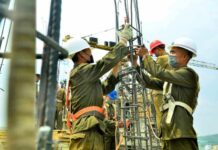South Korea is currently filled with excitement over its April general elections. The newspapers and news shows are plastered with party platforms and the activities of candidates for the 22nd National Assembly. As it happens, North Korea is also supposed to hold elections this year for representatives of its rubber-stamp Supreme People’s Assembly (SPA). The five-year term of representatives in the 14th SPA will end on Mar. 10.
No indications of the election
Precedent from the 14th SPA suggests that the political calendar for the 15th SPA ought to proceed as follows: (1) elections of SPA members announced in early January, (2) general elections held around Mar. 11, (3) first session of 15th SPA announced around Mar. 22, (4) and opening ceremony held around Apr. 12. That would be followed by other major events, including the re-election of the chair of the State Affairs Commission and the amendment of the North Korean constitution.
But though we are already in mid-February, there are no indications of that happening. That’s rather curious, not least considering that some of the administrative preparations, such as drawing up a list of electors, should already be complete following the elections of representatives to regional assemblies on Nov. 26, 2023.
Reasons for the delay
The biggest reason for the delay of the SPA elections is likely the issue of adding a territorial clause through a constitutional amendment, which is one of the key follow-up measures to Kim Jong Un’s “two states” narrative. It is the SPA, after all, that possesses the authority to amend the constitution. That makes the SPA’s upcoming session of particular importance.
North Korea has been bolstering cohesion at home and stoking tensions abroad by lobbing incendiary rhetoric and test-launching missiles as it focuses on implementing the measures called for in Kim’s speech. Even though that has created a sense of crisis severe enough for the foreign press to raise the possibility of war breaking out on the Korean Peninsula, North Korea’s actual provocations have been largely similar in intensity to those of the past. Thus, we appear to be in a lull of sorts.
But after the constitution is amended to add a territorial provision based on the “two states” narrative, all bets are off. More specifically, North Korea will have to respond immediately, and more forcefully than in the past, in the event of any territorial friction with the South.
“As the southern border of our country has been clearly drawn, the illegal ‘northern limit line’ and any other boundary can never be tolerated, and if the ROK violates even 0.001 mm of our territorial land, air, and waters, it will be considered a war provocation,” Kim said in a policy speech before the SPA on Jan. 15. “If the enemies ignite a war, our Republic will resolutely punish the enemies by mobilizing all its military forces including nuclear weapons.”
Kim cannot afford to let his warning become empty words.
Predicting the SPA’s timing
This is the point where North Korea’s leadership has some decisions to make. The point where Kim will shift his focus from cohesion at home and implementing the measures outlined in his speech to manipulating the political situation abroad is after the next SPA, which is supposed to add the territorial clause to the constitution.
North Korea’s leaders are presumably weighing the options of amending the constitution in the final session of the 14th SPA or amending it during the upcoming 15th SPA. But the amendment is more likely to come during the 15th SPA in light of the situation on the Korean Peninsula and the ramifications of that amendment, as well as because of the following reasons: (1) less than a month remains before the 14th SPA ends on Mar. 10; (2) a constitutional amendment is a challenging task that cannot be quickly completed; (3) an extraordinary session of the SPA’s standing committee (the 30th) was already held on Feb. 7 to abolish laws related to inter-Korean economic cooperation, adopt a law related to land development in the Munpyong region, and update personnel assignments at the Central Court.
While North Korea cannot indefinitely postpone the general elections of representatives to the 15th SPA, its decision about when to hold the elections and first session will likely be affected by (1) progress toward implementing plans mentioned in Kim’s speech, including the constitutional amendment; several major political, military and diplomatic events including (2) South Korea’s joint military exercises with the U.S. in March, (3) Russia’s presidential election on Mar. 15 and Vladimir Putin’s expected visit to North Korea, (4) South Korea’s general election in April, and (5) the U.S. presidential election in November; and (6) in seasonal terms, the fact that mid-March is the when the southeasterly winds arise that are suitable for launching balloons filled with propaganda pamphlets into North Korea.
Conclusion
Taking all these trends into account, Kim Jong Un is likely to delay the general elections of representatives and the first session of the 15th SPA as much as possible while biding his time and managing the political situation (continuing strategic and tactical provocations and psychological warfare but avoiding the major political events clustered in March and April). That could well mean that the presumed schedule of announcing the elections in early January, holding the elections in early March, and convening the 15th SPA in early April could be adjusted to late February, April, and May.
As a result, we can assume that the first test of Kim’s “two-states” narrative and threats of war will be the launches of propaganda balloons over the border into North Korea, friction around the Northern Limit Line, and the U.S.-South Korean joint military exercises, which means that South Korean President Yoon Suk-yeol needs to prepare for a variety of potential provocations.
Translated by David Carruth. Edited by Robert Lauler.
Please send any comments or questions about this article to dailynkenglish@uni-media.net.



















